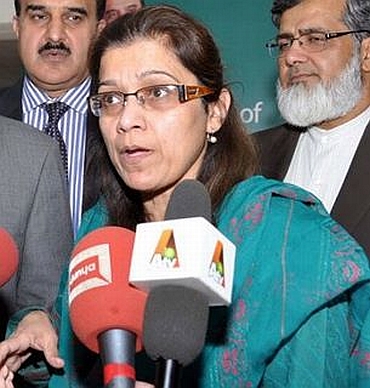United States efforts to seek an end to the war in Afghanistan has reached a "critical juncture", American officials have said indicating that Obama's pointman Marc Grossman is rushing to the region to resume preliminary talks with the Taliban.
Grossman and his team are rushing back to the region to consult several allies, including Afghan President Hamid Karzai, Saudi Arabia and Turkey, to resume negotiations, New York Times reported, quoting US officials.
The breakthrough in negotiations has come after Taliban's spokesman Zabiullah Mujahid, in an emailed statement, said the group is ready to enter peace talks, but would in the meantime continue their armed struggle.
The Times said the announcement by Taliban and its move to open a political office in Qatar "represents a critical point in the United States' attempt to negotiate an end to the Afghanistan war".
The Taliban statement said the group would "increase its political efforts to come to a mutual understanding with the world" to bring peace in Afghanistan.
"But the understanding does not mean surrender from Jihad. The Islamic Emirates is utilising its political wing alongside its military presence and Jihad in order to realize the national and Islamic aspiration of Afghanistan," the Taliban statement said.
US Secretary of State Hillary Clinton said that US special regional envoy Grossman would visit Kabul next week to discuss the peace proposal.
Clinton, after meeting Qatari Prime Minister Sheikh Hamad bin Jassim al-Thani in Washington, said "positive statements" from Karzai and the Taliban signalled support for resuming negotiations.
NYT said Grossman had over the last year led a small team of American officials who met secretly from Doha to Munich with Tayeb Agha, a representative of Afghanistan's Taliban leader Mullah Muhammad Omar "in hopes of starting peace talks".
"Efforts so far by the Obama administration to negotiate an end to the war had faced roadblocks," the paper said. But given the Taliban announcement to open the political office in Qatar, the administration saw this as the best hope for ending the war in Afghanistan.
"Next week, Grossman and his team are rushing back to the region to consult with several allies, including Saudi Arabia and Turkey, and if Karzai gives his blessing, will resume preliminary talks with the Taliban representative before another opportunity slips away," the report said.
The negotiations, described as "potentially historic" and as "politically wrenching" as the Paris peace talks that ended the Vietnam War, come after more than a decade of war in Afghanistan.
"The reversal of the Taliban's longstanding public refusal to negotiate with the United States and the administration's willingness to reciprocate punctuated a highly compartmentalised effort that has proceeded in fits and starts, with the knowledge of very few officials," administration and Afghan officials involved in the negotiations said.
As the US and NATO prepare to withdraw forces from Afghanistan by 2014, the "search for some kind of political reconciliation between the new government and the Taliban became an imperative for the administration," the report said.
The opening of Taliban office in Qatar would be the first of what officials described as a series of reciprocal steps that could include the release of at least five senior Taliban officials held at US prison at Guantanamo Bay.
Adding momentum to the peace efforts was the killing of Al Qaeda leader Osama bin Laden in Pakistan last May, underscoring the increasingly limited ties between Al Qaeda and the remaining Taliban.
One of the conditions that the US has sought is a Taliban renunciation of Al Qaeda and international terrorism. Grossman met Agha personally in Doha in October to discuss "confidence building" measures, including the opening of a political office.
Officials said the situation "pivoted" sharply shortly after Christmas. "In meetings up and down, Afghan government, American and other Western officials made the stakes clear: if President Karzai wanted to leave a peace deal in place when his final term ends in 2014, this was his best chance.
"The Americans wanted the Qatar office to happen, the Europeans were on board and, most important, it appeared the Taliban's leadership was willing.
"What actually ends up unfolding and what understandings are reached to launch something more visible and serious all of that has not been fully determined yet," a senior administration official said.
Officials, however, add that the role of Pakistan in the negotiations still remains uncertain.








